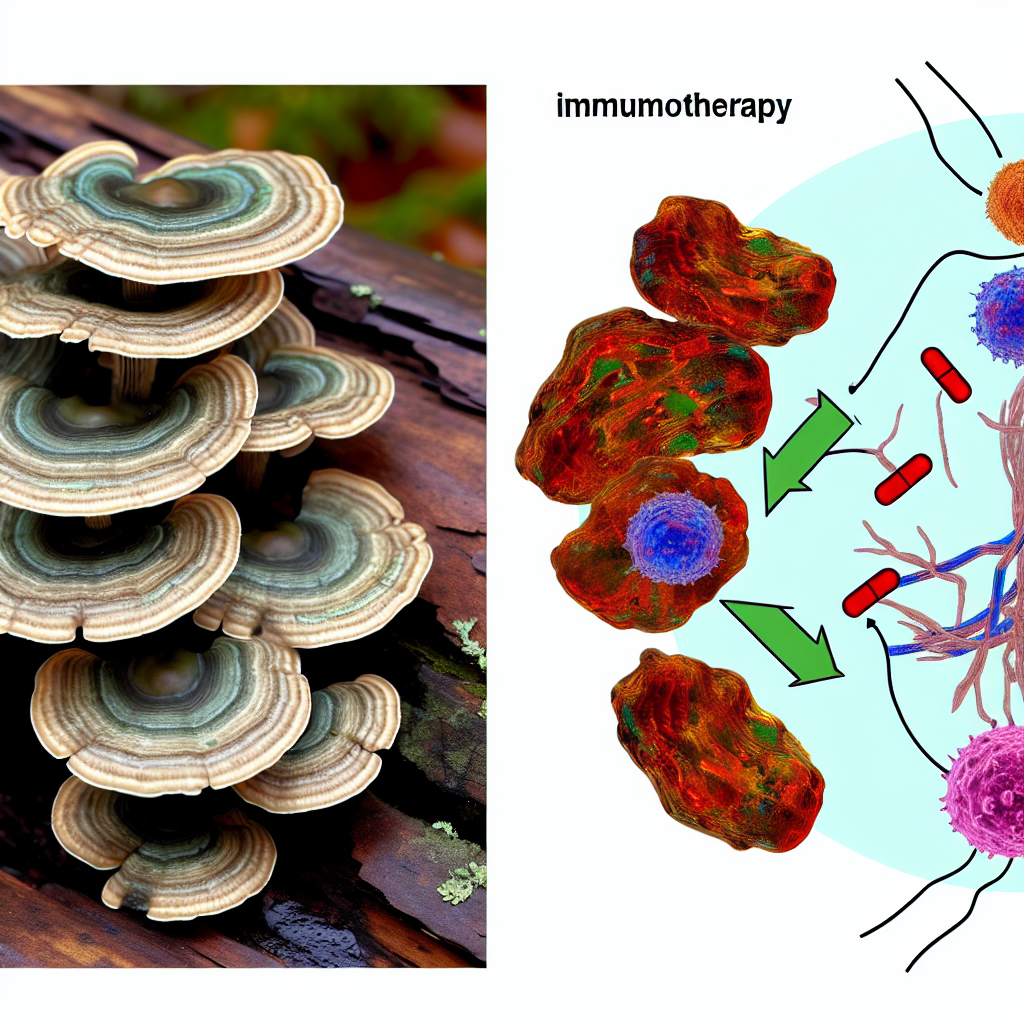Turkey Tail Mushroom and Cancer Immunotherapy Integration Guide
Introduction
Cancer remains one of the most formidable challenges in modern medicine. While conventional treatments such as chemotherapy, radiation, and immunotherapy have revolutionized patient outcomes, there is growing interest in complementary therapies that can enhance the efficacy and reduce the side effects of these interventions. One such promising ally is the Turkey Tail mushroom.
Scientifically known as Trametes versicolor or Coriolus versicolor, this vibrant, multicolored, fan-shaped fungus has long been used in traditional Eastern medicine. It is now being studied extensively for its role in enhancing immune function and supporting cancer treatment outcomes. Key to its medicinal capability are two powerful bioactive compounds: Polysaccharide-K (PSK) and Polysaccharopeptide (PSP). These polysaccharopeptides are believed to help strengthen the body’s immune response, making them particularly valuable in the realm of cancer immunotherapy.
Unlike cytotoxic drugs that directly kill tumor cells, immunotherapy boosts or restores the immune system’s natural ability to target and destroy cancer. Integrating Turkey Tail mushrooms alongside immunotherapeutic regimens may amplify immune activation, helping to address residual disease and prevent cancer recurrence. Furthermore, the mushroom contains powerful antioxidant and anti-inflammatory compounds that help mitigate the oxidative stress and chronic inflammation associated with tumor progression.
Mechanistically, Turkey Tail may activate macrophages, natural killer (NK) cells, and T-cells — all components essential for cancer immune surveillance. This translates to a stronger frontline immune defense, especially in patients whose systems might be weakened by aggressive treatments. Additionally, this mushroom can support gut health due to its prebiotic fibers, which can further influence systemic immunity via the gut-immune axis.
Importantly, Turkey Tail is not a cure, nor a standalone treatment for cancer. Rather, it is considered a potent supportive agent in integrative oncology — forming a bridge between conventional and complementary approaches. As physicians and researchers continue to embrace a more integrative approach to cancer care, understanding how to use natural therapies like Turkey Tail more effectively becomes crucial.
This guide dives into the current clinical evidence, offers insights on safe integration, and highlights the benefits of using Turkey Tail as a complementary tool within cancer immunotherapy protocols.
Features: Clinical Evidence and Studies
The scientific interest in Turkey Tail mushrooms is not new. For decades, researchers, particularly in Asia, have been analyzing the compound’s impacts on cancer outcomes. Countries like Japan and China have even approved Turkey Tail extracts, particularly PSK, as adjuvant therapies in oncology treatment programs.
One of the most well-documented sets of studies is the series known collectively as the PSK clinical trials in Japan during the 1970s and 1980s. These large-scale randomized trials examined the use of PSK in patients undergoing surgery and chemotherapy for various cancers. The findings were notable: PSK recipients had significantly improved survival rates. The effect was particularly strong in patients with colorectal cancer, gastric cancer, and breast cancer ([Polysaccharide-K and cancer studies – PMC NIH](https://www.ncbi.nlm.nih.gov/pmc/articles/PMC4684115/)).
In the West, interest has gained traction more recently. A 2012 clinical study published in the journal Global Advances in Health and Medicine, conducted by researchers at the University of Minnesota, evaluated Turkey Tail in breast cancer patients post-chemotherapy. The women underwent six weeks of Turkey Tail supplementation, which resulted in a significant improvement in immune parameters, namely increased counts of lymphocytes and natural killer cell activity ([Turkey Tail mushroom and immune benefits – PubMed](https://pubmed.ncbi.nlm.nih.gov/23157235/)).
A further Phase I clinical trial was carried out by Bastyr University in conjunction with the National Institutes of Health (NIH), examining the safety profile and immune response in breast cancer patients using a Turkey Tail extract. The results confirmed the supplement was not only well tolerated but helped stimulate favorable changes in immune function ([Turkey Tail breast cancer trial – NIH Clinical Trials](https://clinicaltrials.gov/ct2/show/NCT00926095)).
From a mechanistic standpoint, PSK and PSP interact with the body’s innate immune system by binding to Toll-like receptors (TLRs), which then activate signaling cascades that result in stronger immune responses. These pathways influence cytokine release, enhancing immune surveillance and promoting tumor suppression without harming normal tissues.
Turkey Tail also shows potential in helping offset side effects from chemotherapy such as fatigue, liver toxicity, and poor gut health. Its supportive properties offer physical and mental resilience during the taxing journey of cancer treatment.
Conclusion
Turkey Tail mushroom emerges as a powerful natural adjunct in the integrative management of cancer through its demonstrated ability to stimulate the immune system and support recovery during conventional treatment. With decades of use in traditional medicine, validated by modern studies and clinical trials, this mushroom holds promise in improving outcomes, reducing side effects, and contributing to a more holistic model of oncology treatment.
For individuals facing cancer — be it patients, loved ones, or medical professionals — incorporating Turkey Tail supplements as part of an immunotherapy protocol must always be approached with informed medical guidance. As the field of integrative oncology continues to grow, building bridges between natural compounds and advanced medicine may ultimately redefine optimal cancer care strategies.
References
– Polysaccharide-K and cancer studies – PMC NIH
– Turkey Tail mushroom and immune benefits – PubMed
– Turkey Tail breast cancer trial – NIH Clinical Trials
– American Cancer Society: Medicinal Mushrooms
– Memorial Sloan Kettering Cancer Center – Turkey Tail Mushroom
Concise Summary
Turkey Tail mushroom, rich in polysaccharopeptides like PSK and PSP, strengthens immune responses in cancer patients and shows promise as an integrative therapy alongside immunotherapy. Clinical studies in Japan and the U.S. suggest that Turkey Tail may improve survival and immune function, especially in breast, gastric, and colorectal cancers. It works by activating Toll-like receptors and boosting natural killer and T-cell activity. With a strong safety profile, Turkey Tail offers a complementary path for enhanced cancer care, especially in integrative oncology approaches aimed at blending conventional treatments with immune-enhancing natural agents.

Dominic E. is a passionate filmmaker navigating the exciting intersection of art and science. By day, he delves into the complexities of the human body as a full-time medical writer, meticulously translating intricate medical concepts into accessible and engaging narratives. By night, he explores the boundless realm of cinematic storytelling, crafting narratives that evoke emotion and challenge perspectives. Film Student and Full-time Medical Writer for ContentVendor.com




